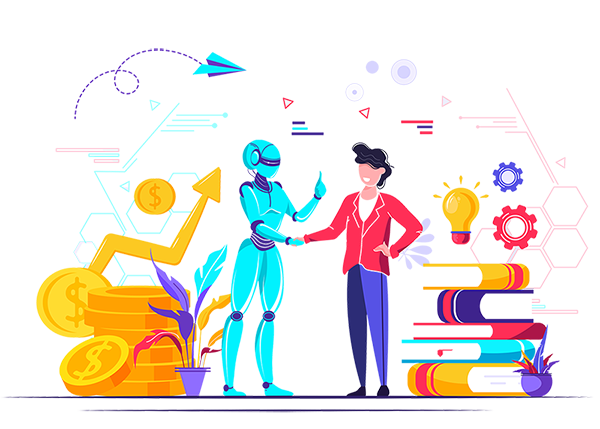
19 Jul Impact of Artificial Intelligence on Learning and Development
The role of artificial intelligence (AI) in human lives has become increasingly significant in recent years. From personal assistants to healthcare advancements, AI is reshaping various aspects of our daily lives. According to research firm Markets and Markets, the AI market is projected to reach a staggering $190 billion industry by 2025.
Lately, enterprises have recognized the value of AI and have integrated it into their learning strategies, particularly in employee training programs. AI has proven to be a powerful tool that complements and enhances human capabilities, enabling us to achieve greater efficiency, accuracy, and productivity. This article walks you through the powerful role played by AI in learning and development.
- Personalized Learning: AI allows for personalized learning experiences by analyzing individual learners’ data and tailoring content and assessments to their specific needs and preferences.
- Intelligent Content Curation: AI can analyze vast amounts of educational content and recommend relevant resources based on learners’ specific requirements, saving time and providing targeted materials.
- Instant Feedback and Assessment: AI-powered systems can provide immediate feedback on assignments and assessments, offering detailed insights and promoting continuous improvement.
- Predictive Analytics: AI algorithms can analyze learner data to identify patterns and predict future learning outcomes, helping professionals make data-driven decisions and optimize interventions.
- Virtual Assistants and Chatbots: AI-driven virtual assistants and chatbots offer immediate support, answer questions, provide guidance, and enhance learner engagement.
- Automation of Administrative Tasks: AI automates routine administrative tasks, such as enrollment and scheduling, freeing up time for instructors and administrators.
- Intelligent Tutoring Systems: AI-powered tutoring systems simulate one-on-one learning experiences, adapting to individual needs and offering personalized guidance and support.
- Data-Driven Insights: AI enables the collection and analysis of learning data, providing valuable insights into learner behavior, performance, and instructional effectiveness, optimizing learning experiences.
Personalized Learning
AI empowers customized learning experiences by analyzing learner data and tailoring content to individual needs. It identifies knowledge gaps, recommends relevant resources, and adapts the learning journey based on learners’ progress and preferences. Through adaptive assessments and targeted content delivery, AI ensures that learners receive customized guidance, maximizing their learning potential.
Intelligent Insights and Analytics
AI harnesses the power of data to provide valuable insights and analytics. It analyzes learner performance, engagement patterns, and feedback to generate actionable information for instructors and learning designers. These insights enable continuous improvement of learning programs, identifying areas that need attention and fine-tuning content and delivery methods.
AI as a Tutor
With AI-powered intelligent tutoring systems, learners can have access to personalized guidance and support. These systems foster one-on-one interactions, offering real-time explanations, examples, and practice exercises. Learners can receive immediate feedback, helping them grasp concepts more effectively and progress at their own pace.
Virtual Reality and Immersive Experiences
AI-driven technologies, such as virtual reality (VR) and augmented reality (AR), provide immersive learning experiences. Learners can step into realistic simulations, explore virtual environments, and engage in interactive scenarios. These technologies enhance understanding, retention, and application of knowledge, making learning more engaging and memorable.

Content Curation and Recommendation
AI assists in content curation by analyzing vast amounts of educational resources. It identifies relevant content, recommends suitable materials, and personalizes learning pathways. Learners benefit from curated content aligned with their interests, ensuring they access the most appropriate and up-to-date resources.
Automation and Administrative Support
AI automates routine administrative tasks, such as enrollment, scheduling, and record-keeping. This frees up time for instructors and administrators to focus on more strategic activities, improving efficiency and reducing administrative burdens.
Final Thoughts
Organizations leveraging AI for learning and development are unlocking a new realm of possibilities. By harnessing the power of AI, they can deliver personalized and adaptive learning experiences, gain valuable insights and analytics for continuous improvement, and create immersive and engaging environments for learners.




